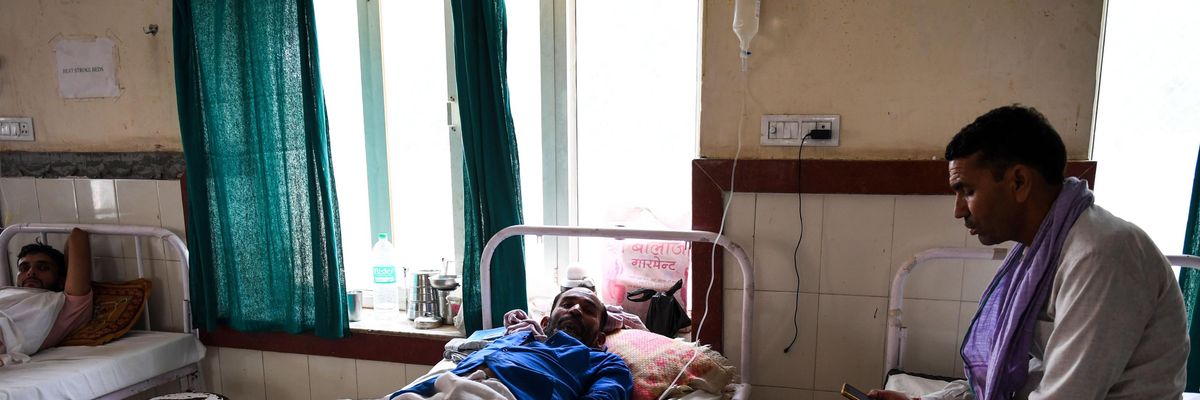Providing further evidence of the deadly consequences of the fossil fuel-driven climate emergency and the far-reaching health benefits of decarbonization, new research out Thursday shows that eliminating greenhouse gas emissions within the next three decades would save tens of millions of lives around the world.
Roughly 74 million lives could be saved this century if the emission of heat-trapping gases is cut to zero by 2050, compared with a far more lethal scenario in which society fails to limit global temperature rise to less than 4degC. That's according to Daniel Bressler, a Ph.D. candidate at Columbia University's Earth Institute whose peer-reviewed journal article, "The Mortality Cost of Carbon," was just published in Nature Communications.
There is "a significant number of lives that can be saved if you pursue climate policies that are more aggressive than the business-as usual scenario," Bressler told The Guardian. "I was surprised at how large the number of deaths [is]. There is some uncertainty over this, the number could be lower but it could also be a lot higher."
Bressler acknowledged that his projections of excess deaths from carbon emissions "may well be 'a vast underestimate' as they only account for heat-related mortality rather than deaths from flooding, storms, crop failures, and other impacts that flow from the climate crisis," the newspaper noted.
For instance, a study on fossil fuel-related air pollution--not extreme heat--published in February found that exposure to particulate matter from dirty energy emissions killed an estimated 8.7 million people in 2018 alone, accounting for 18% of total global deaths that year.
The new study released Thursday builds upon a concept called the "social cost of carbon," a measurement created by Nobel prize-winning economist William Nordhaus to estimate the economic and environmental damage associated with pumping one metric ton of carbon dioxide into the atmosphere.
"Nordhaus came up with a fantastic model, but he didn't take in the latest literature on climate change's damage upon mortality," said Bressler, who added that "there's been an explosion of research on that topic in recent years."
As NPR noted Thursday: "The connection between a hotter planet and human death and disease has become clearer, thanks to a series of research papers. A study published in 2021 found that about a third of heat-related deaths worldwide can be directly attributed to human-caused climate change. A 2020 Lancet report warned that climate change is the biggest global public health threat of the century."
Those findings, however, "have not been factored into one of the three major computer models that scientists, economists, and the federal government use to calculate" the social cost of carbon, NPR reported, meaning that "policymakers may be underestimating the cost of climate change to human life."
Bressler's research seeks to fill that gap, and "he hopes the findings will be helpful to a federal working group currently reassessing how the government calculates the costs and benefits of climate policies," the news outlet added.
According to Nordhaus' DICE model, the 2020 social cost of carbon is $37 a metric ton, but when Bressler accounts for the mortality cost, this figure climbs to $258 a ton.
Bressler pointed out that a more accurate assessment of the negative consequences of carbon is especially important now that Congress and state governments are contemplating major investments to upgrade the nation's infrastructure and slash U.S. emissions in half from 2005 levels by 2030.
After analyzing the temperature-related mortality impacts of carbon pollution, Bressler concludes that for every 4,434 metric tons of carbon dioxide emitted in 2020, one person will die prematurely from a heat-related illness between 2020 and 2100. He notes that "4,434 metric tons is equivalent to the lifetime emissions of 3.5 average Americans, 146.2 Nigerians, and 12.8 average world people."
In a study last year on "carbon inequality," Oxfam and the Stockholm Environmental Institute found that the world's richest 1% emit more than twice as much carbon dioxide as the poorest 50% of humanity. While 63 million people were responsible for 15% of global emissions between 1990 and 2015, 3.1 billion were responsible for just 7%.
Vast global disparities in greenhouse gas emissions are undeniable and a reflection of massive levels of inequality between wealthy and impoverished countries. However, given the high levels of inequality within rich countries--and the presence of a small class of "super-emitters" as well as the U.S. military's enormous "carbon bootprint" --it would be misleading to suggest that every person in the Global North contributes equally to causing the climate crisis.
Bressler's data show that a coal-fired power plant is much deadlier than the emissions associated with an average American: "The mortality cost of carbon implies that removing (adding) a year's worth of carbon dioxide emissions from an average coal-fired power plant in the United States in 2020 saves 904 lives (causes 904 excess deaths) in expectation from 2020 to 2100."
Bressler told The Guardian that ordinary working people "shouldn't take their per-person mortality emissions too personally. Our emissions are very much a function of the technology and culture of the place that we live."
For that reason, progressives have long argued that policymakers should focus on implementing society-wide changes to reduce inequality and carbon pollution simultaneously, by creating millions of unionized jobs in the renewable energy sector and providing an abundance of low-carbon public goods rather than perpetuating high-carbon forms of individual consumption.




